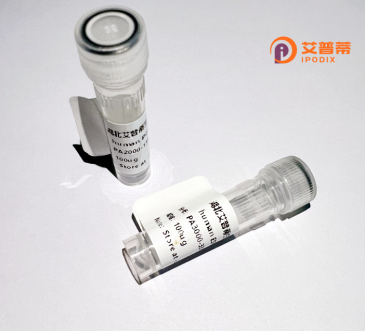
| 纯度 | >90%SDS-PAGE. |
| 种属 | Human |
| 靶点 | STARD4 |
| Uniprot No | Q96DR4 |
| 内毒素 | < 0.01EU/μg |
| 表达宿主 | E.coli |
| 表达区间 | 1-205 aa |
| 活性数据 | MEGLSDVASF ATKLKNTLIQ YHSIEEDKWR VAKKTKDVTV WRKPSEEFNG YLYKAQGVID DLVYSIIDHI RPGPCRLDWD SLMTSLDILE NFEENCCVMR YTTAGQLWNI ISPREFVDFS YTVGYKEGLL SCGISLDWDE KRPEFVRGYN HPCGWFCVPL KDNPNQSLLT GYIQTDLRGM IPQSAVDTAM ASTLTNFYGD LRKAL |
| 分子量 | 23.5 kDa |
| 蛋白标签 | His tag N-Terminus |
| 缓冲液 | PBS, pH7.4, containing 0.01% SKL, 1mM DTT, 5% Trehalose and Proclin300. |
| 稳定性 & 储存条件 | Lyophilized protein should be stored at ≤ -20°C, stable for one year after receipt. Reconstituted protein solution can be stored at 2-8°C for 2-7 days. Aliquots of reconstituted samples are stable at ≤ -20°C for 3 months. |
| 复溶 | Always centrifuge tubes before opening.Do not mix by vortex or pipetting. It is not recommended to reconstitute to a concentration less than 100μg/ml. Dissolve the lyophilized protein in distilled water. Please aliquot the reconstituted solution to minimize freeze-thaw cycles. |
以下是与重组人STARD4蛋白相关的3篇文献概览:
1. **"STARD4 mediates the intracellular transport of cholesterol and modulates cellular cholesterol homeostasis"**
- **作者**: Rodriguez-Agudo, D. 等
- **摘要**: 研究通过重组人STARD4蛋白实验,揭示了其在细胞内胆固醇运输中的关键作用,发现其通过促进胆固醇从溶酶体向细胞膜的转运调节胆固醇稳态,并可能影响肝细胞脂代谢。
2. **"Crystal structure of human STARD4 reveals a conserved lipid transfer mechanism"**
- **作者**: Luo, J. 等
- **摘要**: 利用重组人STARD4蛋白解析其晶体结构,发现其保守的脂质结合口袋结构,并证明该蛋白通过直接结合并转移胆固醇,对维持细胞膜脂质组成至关重要。
3. **"Functional characterization of STARD4 in macrophage cholesterol efflux and atherosclerosis"**
- **作者**: Methia, N. 等
- **摘要**: 通过重组蛋白模型,发现STARD4在巨噬细胞中促进胆固醇外流至载脂蛋白A-I,减少泡沫细胞形成,表明其在动脉粥样硬化中具有潜在保护作用。
以上研究涵盖了STARD4的结构、运输机制及其在疾病中的功能,均为重组蛋白实验提供了关键依据。如需具体文献年份或期刊信息可进一步补充。
**Background of Recombinant Human STARD4 Protein**
STARD4 (StAR-related lipid transfer domain 4) is a member of the STAR superfamily, which plays critical roles in intracellular cholesterol transport and metabolism. This soluble protein, expressed ubiquitously but predominantly in the liver and intestines, facilitates non-vesicular cholesterol movement between membranes via its START domain—a conserved structural motif that binds hydrophobic molecules. STARD4 specifically mediates cholesterol transfer from the plasma membrane to the endoplasmic reticulum (ER), thereby regulating cholesterol homeostasis.
By maintaining ER cholesterol levels, STARD4 influences signaling pathways such as SREBP (sterol regulatory element-binding protein) activation and ACAT (acyl-CoA cholesterol acyltransferase)-mediated esterification. Its function complements other sterol transporters like STARD1 (in mitochondria) and STARD3/STARD5 (in late endosomes or ER), highlighting its unique role in cytoplasmic cholesterol distribution. Dysregulation of STARD4 has been linked to metabolic disorders, including atherosclerosis and fatty liver disease, due to altered cholesterol trafficking and storage.
Recombinant STARD4 protein, produced via expression systems like *E. coli* or mammalian cells, enables mechanistic studies on cholesterol dynamics and therapeutic exploration. Research focuses on its potential as a drug target for lipid-related pathologies or as a biomarker for metabolic syndrome. However, its precise regulatory mechanisms and interactions with other lipid-binding proteins remain under investigation, underscoring its significance in cellular lipid biology.
×